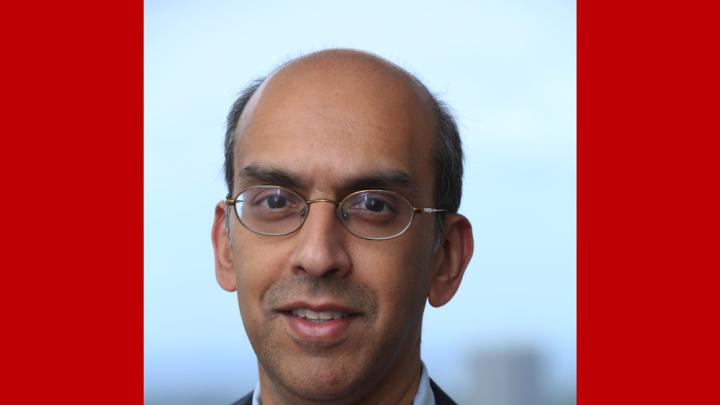A week after Harvard Management Company (HMC) reported continued disappointing investment returns for the University’s $35.7 billion endowment, the University announced that N.P. Narvekar, chief executive officer of Columbia University Investment Management Company, has been appointed president and CEO of HMC, effective December 5. He succeeds Stephen Blyth, who became president and CEO at the beginning of 2015, but then went on medical leave last May and later resigned.
Narvekar, who has been in his Columbia role since 2002, is credited with improving performance there: according to the Harvard news release, Columbia’s compound annualized rate of return for the 10 years through fiscal 2015 (the latest year reported) was 10.1 percent. For the same period, HMC’s annualized rate of return was 7.6 percent—and for the decade ending this past June 30, that declined to 5.7 percent, reflecting the investment losses incurred in the most recent 12 months. The University derives about 35 percent of its operating revenue ($1.7 billion for fiscal 2016) from endowment distributions. Given the size of Harvard’s endowment, investment returns that lag significantly behind those of peer universities, and below Harvard’s own goals, are a serious concern for the University’s entire financial model. Hence the importance of this appointment, which was a subject of extensive (and as it turns out, accurate) prior reporting in the financial press, including The Wall Street Journal and Bloomberg.
Columbia’s financial statement indicates that its endowment, like Harvard’s, is diversified among the kinds of investments with which individuals are familiar (stocks and fixed-income securities), and the illiquid asset classes requiring more sophisticated management that have become common among institutional investors, like endowments and pension funds, with long-term time horizons: private equities, absolute-return (hedge-fund) portfolios, and real assets. The latter three categories accounted for $6.6 billion of the $9.6 billion (68.5 percent) in cash, cash equivalents, and long-term investments listed in Columbia’s June 30, 2015, financial statement.
That statement also indicates the different scale of operations for which Narvekar is now assuming responsibility. HMC’s endowment assets are roughly four times the size of the Columbia portfolio, and its staff—which includes both internal investment professionals and those responsible for selecting and overseeing external managers—is more than 10 times larger than Columbia’s roster of 20 (as reported in The Boston Globe).
Thus, in taking on the paramount challenge of improving the performance of a large portfolio with many relatively long-term, illiquid assets—a challenge that, as reported, involves decisions about asset allocation, relationships with external investment managers, portfolio oversight, and execution—Narvekar must also address significant questions about HMC’s organization and operations.
According to the University’s September 29 news release:
Harvard University today announced that N.P. (Narv) Narvekar has been appointed to the position of president and chief executive officer of Harvard Management Company (“HMC”). Narvekar will assume his role at HMC on December 5, 2016, and will report to HMC’s Board of Directors.
Narvekar was most recently chief executive officer of Columbia University Investment Management Company (“IMC”), a position he held since 2002. In this role, Narvekar was responsible for setting and leading investment strategy for Columbia’s $9-billion endowment portfolio. IMC has delivered annualized returns over the ten-year period through FY 2015 of 10.1%.
“Harvard Management Company plays a critically important role in supporting the students, faculty and staff who advance the teaching and research mission of the university,” said Drew Faust, president of Harvard University. “We are pleased to welcome Narv to Harvard and are confident that his leadership skills and deep experience at the highest levels of investment management will position HMC for long-term success.”
“Narv is a highly successful endowment manager with an outstanding 14 year track record heading a large endowment, providing steady leadership and delivering strong returns,” said Paul Finnegan, chairman of the HMC Board of Directors and a member of the Harvard Corporation, the University’s principal governing board. “He is a superb leader and mentor with a proven ability to recruit, build and retain a talented and committed investment team.”
Narvekar said, “It is an honor to join such a prestigious investment organization and help support the mission of Harvard University. HMC has an unparalleled investment platform among endowments and I look forward to working with the HMC Board and team and using my investment experience to serve Harvard in the most effective way possible.”
Finnegan added, “On behalf of HMC and the University, I want to thank and acknowledge Bob Ettl for his effective and steady hand in leading HMC during the transition. Bob is an important leader within HMC and we are grateful he will continue serving as chief operating officer going forward.”
Before joining Columbia, Narvekar was a managing director in the office of investments at the University of Pennsylvania, where he focused primarily on building the hedge-fund and private-equity portfolios. Prior to this, he held positions at J.P. Morgan & Co. including managing director, equity derivatives group and vice president, private placement advisory group.
Narvekar holds an M.B.A. from The Wharton School of the University of Pennsylvania [1991]and a B.A. in economics from Haverford College [1984].
The complete text of the news announcement appears here.







